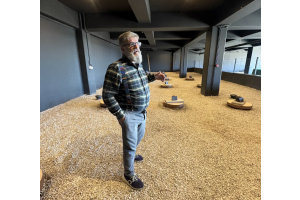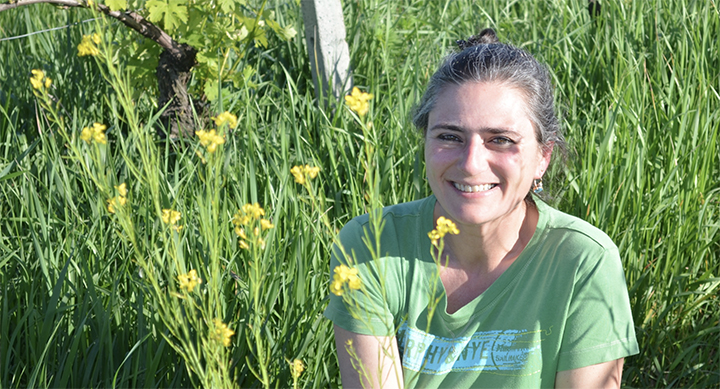
"Punset" is from the Piedmontese dialect meaning “beautiful hill.” The estate is located in Neive, in the heart of the Langhe area of Piedmont on top of a hill overlooking the historic capital. It was given the nickname by the Count of Neive to describe the view of their lands emerging by the autumn fog viewed from his castle.
During the 1980s Marina Marcarino took over the estate and began formally converting the property to organic farming, rejecting the use of all kinds of pesticide and chemical products. Her agronomic practices include minimal use of treatments based on copper and sulfur, preferring biodynamic preparations and embracing the philosophy of Manasobu Fukuoka, also called “agriculture of not doing.” Vineyards are kept green and there is a limited working of the soil with the ideal that the farm is perfectly integrated into nature.
Grape Collective: Marina, tell us a little bit about the family history as it relates to your winemaking.
Marina Marcarino: Our estate has been owned by my family for four generations. However, before me, they all were making wine as a hobby and not as their main work. And my family was in the construction business. I actually was supposed to become an engineer because they wanted me to run the construction company. And my story's a little funny because when I was a kid I was a very bad kid and I was fired by three different kindergartens. So, my grandmother offered my parents to take care of me and she was doing that, bringing me to the vineyards and to the farm because at that time they also had other stuff, fruits and vegetables, animals and so on. So, I fell in love with the farming in general. My idea was to make wine because my grandmother was making wine, and this is also interesting because it was my grandparents' hobby, my grandfather, my uncles and my father. But the real person that was making the wine was my grandmother. We had this pre-made route already. And then, when I grew up, I was not allowed to go to the winemaking school because I was a girl and because they wanted me to become an engineer. But when I was at the college, I decided to tell my family that I wasn't attending engineering but I wanted to farm, and finally I went my way. Then I'd been discovered of course, sent working into the construction company. Then it was clear that I couldn't work in that field because it was horrible to me. And so I asked my father an agreement to let me do at least for one year, the farming. And if I don't lose money, I will do what they like, otherwise, I promise I will be with you.
But the real person that was making the wine was my grandmother. We had this pre-made route already. And then, when I grew up, I was not allowed to go to the winemaking school because I was a girl and because they wanted me to become an engineer. But when I was at the college, I decided to tell my family that I wasn't attending engineering but I wanted to farm, and finally I went my way. Then I'd been discovered of course, sent working into the construction company. Then it was clear that I couldn't work in that field because it was horrible to me. And so I asked my father an agreement to let me do at least for one year, the farming. And if I don't lose money, I will do what they like, otherwise, I promise I will be with you.
And my father allowed me to do that because he thought it was the only way to let me forget this crazy idea. He was mistaken because I am here and plus I had only very little, only 19 euros, but it was a plus. And so I won. That was also the year that I started working organic because I was needing a support. I wasn't yet in the knowledge of running a farm, a vineyard. And so I asked my teachers at the university to give me help and they told me that the only keys would've been to have a project and my project at that time, it was to work organic. So we started organic growing with the support of the university.
And what year was that?
1982. In 1987, finally, we got the regulation in Italy and so it was possible to officially apply for being certified. Before that, it was not. And so, we got to the first certification number, number one at the time. Then in 2002 we had the European regulation and everything changed and we started with the new application numbers.
However, in 1990 I decided to add the biodynamic method to the organic growing. Biodynamic was to me, something very interesting, a philosophy, a way of watching nature in a different view. Because when you start working organic you see that things are changing, if you watch. And the more and more you see that nature can do a lot in relation to the moon, in relation to what is going on around of you. So, I thought that biodynamic was really something interesting to apply. And in the same year, we started to skip the selected yeast, at that time selected yeast were giving all the same taste.
Chardonnay was tasting of banana, always. But even Arneis, even Pinot Grigio, even Gewürztraminer was tasting of banana at the time. And they don't want you to be in this big mess of a wines are all the same. Because my choices were different and my goals were even different. And so I started to practice without yeast and the beginning was only for the reds. And in 1997 we added the first white fermented 100% without the yeast added. Before that, we were using yeast but not selected. And I changed the style with the time at the beginning was a more a lighter Arneis and they also make a bianco more or less in this style. And little by little I forced a little more on skin contact because I liked to express the variety.
And then in the year 2007, I fell in love with Masanobu Fukuoka and I decided to add to the agriculture of not doing. The agriculture of not doing is not working. It is just the not impacting with nature, allowing nature to do its own job. So, it mainly consists in not working the silo, not chopping the grass, not chopping the wood, not giving manures in particular, animal manures, and leaving different varieties of grass growing spontaneously. On the other hand, doing this, you have a lower production, this is what you should consider. But at the same time, you spray much less. In fact with this practice, we were able, year by year, to reduce the quantity of copper. And now we are two to three hundred grams per hectare per year, which is one tenth of what is allowed. My real goal is to skip copper at this time. We even tried with some homeopathic remedies.
It is still difficult, in particular, we pay attention during the blooming time, during the time where the vines are more exposed to pathologies because they're working so hard that their defenses are lower. And so we use mainly copper and at that time as a protection. We mainly use homeopathic remedies, also when we have big problems, like unfortunately in 2017 and 2018 we got big hail storms. In 2017 it was in the wrong time because it was before Easter so, we had to reprune everything. And I can tell you that the vines were really sad. So I made this spraying with the aconitum, calendula and arnica and all my neighbors were laughing about that. But after three days our vines were, you know, standing green with the open leaves, very happy.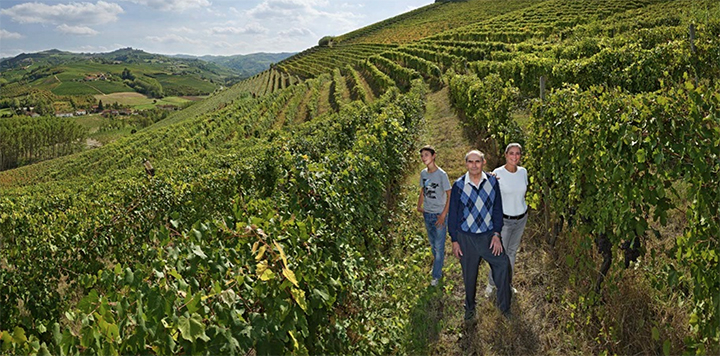
What were those three?
They are homeopathic remedies. We bring the connection to soil to the sky, this is the idea. And I can tell you that with two drops of arnica (also known as wolf's bane), we can spray two hectares of vineyards.
And so we use almost anything. Of course, it is also a choice of the life. In my family, we use mainly homeopathic remedies. My son is 21, never saw an antibiotic, and he's very happy. Thank God. Of course, there is a different approach. And you know, my first idea on organic was when I was very young because it was the time when, the best way to show that you were doing well was to have blue vineyards because people were spraying this product, very poisoning, that was a like a deep blue, like the sea. And from outside you are seeing these blue hills and all these people that were spraying with this product were sick.
And so I thought why should I color my vineyard? I've been very lucky because you know, this being not a main work, but a hobby, no one used herbicides in our estate, even my grandfather, and so I was able to work a soil already pure. But I should say that systemic products of that time were super strong and there was not a protection. You know, when I was young they were spraying with helicopters. Now, thank God, it is not allowed anymore. And so, my idea of working in a farm was to stay away from all this poison and stuff. Otherwise, the engineering work was perfect. And so, going through these experiences it became quite normal to try homeopathic instead of conventional remedies, even organic certified and we use a lot of them over homeopathic stuff.
Why do you think that there isn't a greater number of wineries in Piedmont that have braced organic viticulture?
Because I think there are two reasons. One, is that they are afraid. They are afraid because they are used to work conventionally and they are used to have a look to the vineyard which is like a living room. Everything should be perfect, the grass should be very short or maybe not being there, you should keep the vine very clean. This is a little against organic and so if you don't change the mentality, you risk to really drop into a big infection and bring you back to your older, very sure and safer conventional methods.
Another reason, I think, is that there is not an advertising of organic. You know, we are considered like the strange people to be kept aside. And I see both in the vineyards, in the winery, we always go through big troubles because our vineyards are different. We got like 10, 15 controls every year. And they say, "Okay, you should start working properly," which is, what is properly? And same with our wines, when we go through the request for the official appellation, you know, this next year, we always get notes that the wines are out of the typical taste because the typical taste is banana for Arneis, but has nothing to do with the grape. So, I think that there is a really big wave of pushing of conventional because economically it is much more convenient. You know, organic, at the end, is not convenient for many side of the society.
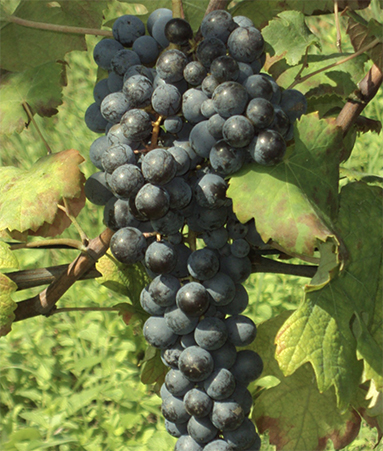 And so one of the things that I hear when I ask people about organics in Piedmont is that, you know, there is a lot of of rain and moisture, which causes mildew, which makes it more difficult to farm organically. How do you feel about the level of difficulty for organic viticulture in Piedmont? Is that a legitimate excuse?
And so one of the things that I hear when I ask people about organics in Piedmont is that, you know, there is a lot of of rain and moisture, which causes mildew, which makes it more difficult to farm organically. How do you feel about the level of difficulty for organic viticulture in Piedmont? Is that a legitimate excuse?
What do you think about Alsace? Do they have less rain than Piedmont?
So I think that there are places in the world where it rains. We are back to the fact that if you know what you're doing, you take the risk. We also have the weather change. We're going through hot and so for the same reason we should consider to put fans in the vineyard to keep everything fresh. I think that we should measure ourselves with the climate. It is possible. I am not afraid to see the rain. And I know that infections, like for human being, show when you have defenses that are very low. And your defenses are very low, when you're very stressed and we are requested to do something that you are not able to do, to have it.
So until the way you're on getting back with the pruning and pruning and pruning, repruning to low quantity, the plant is under stress seven, eight months a year. And for sure it is more exposed. So, it is a question of practicing and I think that the weather is really a sort of excuse. If we go to France, we see that organic is much more popular, since a long time. And I know the country quite well. I know that there are areas that are rainy as Piedmont or even more. So, I disagree a little with that.
And let's talk about natural yeast. So, you decided to go to natural yeast and that was something that was very unusual in Piedmont at the time. How did you come to that decision and how do you feel that it's reflected in the wines?
I got to that decision because I, you know, I was doing differently in the vineyards. And I was named, because it was different, "the crazy." So I said, "okay, to be the crazy, I want to be 100% crazy." No, I'm joking. But it was very sad to see that the effort to have beautiful grapes, to have a high quality, nice sugar content, was always bringing to wine very similar to my neighbor. Because we use selected yeast and, at the time, they were also not many, all the wines were tasting of banana and pineapples and all the Barolos were having sensational fruit that is not typical, tobacco and chocolate, that you got normally with a long aging. So I said "why I should do that?" And I tried my first, you know, the first were really experiences and so a little quantity making the wine without the selected yeast and with the natural fermentation, picking grapes in the same vineyard. And you know, the result was so different.
And there were some peculiarities that I was finding always in my wines are made natural, even with different varieties, like the freshness and the mint hint and this sort of herbal sensation of different tastes that is very typical. And so I decided to skip the natural yeast in only one vintage, in 1994, when we decided not to make the Barbaresco because it was very rainy, we used for the fermentation the yeast, but not selected, because the skin was so thin that there was too high a risk of VA. and you know, I started to work this way in a time where it was not really allowed to have a wine with big defects.
Now VA is almost a something positive, not for me but, so I also learned it to work in a way very clean and in my opinion, making natural wines doesn't mean to develop it to the bottle, deposit a bad smell or stink and the VA. I think that all of that is a part of the winemaking and the winemaking is a process that natural or conventional isn't always the same and it is one of the bases, the cleanest. And so I am used to make wine that wants to be very clean, as transparent as possible, as clear as possible, even without using clarification. We just move it away and several times to keep it clean and always when the moon is laying because it is one of the biodynamic practices that allows to have a better clean wines.
Talk a little bit about the Barbaresco. How would you describe that wine?
In two words it's one of the most elegant wines of the world. I think that this is the real peculiarity of this Nebbiolo because you know, but Barbaresco is 100% Nebbiolo as Barolo, as Roero or as Gattinara. What really is the expression of Barbaresco is the elegance, it's not a wine with big shoulders. Normally, it shows a much nicer when the vintage is average respected to a Barolo because Barolo needs to have the power, should be a bombing wine. And I think that at the Barbaresco can really give you a complexity of sensation from the first approach up to one hour in the glass because it develops different aromas and different tastes that they are all tied together. And the elegance in the softness of this wine that make it also drinkable out of a meal. We not necessarily need to have food with it, much difficult with other big red wines of the world.
So I think that we should be very proud of this niche wine because you know, the production of Barbaresco in total is very low. The total production is less than 5 million bottles. So, that means that in New York we have not one bottle each. And I think that this wine, this appellation, made a mistake. It wanted to be always in the Barolo shadow. And you know, little brother, the queen, the little sister, the prince, all these nicknames that in my opinion should be really canceled, it then is its own identity. And I am sure that when people approach it this wine, they can really appreciate it. Because it is not a wine that asked to be a super connoisseur, as a first impact.
And talk a little bit about your own Arneis.
Yes, my kid. My Arneis is very different from what we are used to. I decided to use a spontaneous fermentation with skin for this wine because I wanted to develop the peculiarity of this variety, rich complex. You know, Arneis is a grape that if fermented, in red in full until dry, can give tannins, not to big tannins is as an Nebbiolo, but is probably the only white in the world that can develop these characters. So, at the beginning I was making it with spontaneous fermentation without a skin contact. I was just making the, you know, the food of fermentation with skins and then they taking the juice. And then, little by little we started to increase the percentage of red fermentation.
Now we jumped into 50% with 10 days of skin contact fermentation. This allows to develop the peculiarity of the variety, maintaining, at the same time, the freshness and the floral characters of this grape. Which is what I like about her because the typicity of Arneis is white flowers and white fruit.
And too often, we are missing that characters, even for the temperature of fermentation. So, we don't use a temperature control. But, we try to maintain the fermentation at low temperature, adding in, you know, in more shots, the part of the juice, which is kept, of course cold because othewise it ferments. And this allows even to do, have a fermentation quite long, about one month, even more sometimes, without raising more than 18 degrees Celsius. And so these maintains the freshness of the fruit and we don't turn to jammy or cooked sensation or even red fruit at this tropical sensation, which is nothing to do with the grape. And I see that people are starting to appreciate to this kind of a style.
So there's quite a lot of effort that goes into being organic. How does that reflect in the wines that you make at the end?
The effort that we make in working organic is of course the something that reflects on the wine itself. I think mainly as a personality. Wines that are the result of organic growing are always very tied to the territory. So in the same hill where it looks like being everything the same, the soil change from one line to the other and we're able to develop these peculiarity. Also the natural itself is different. We have a sort of better life for plants, for animals, for insects, which makes a wine, let's say charming, welcoming and they can see that this is the difference you can really find in all organic wine. I told you I only drink organic.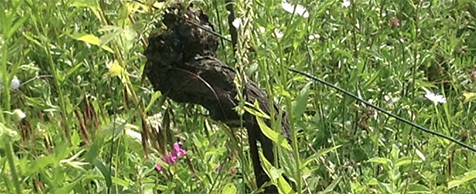 Talk a little bit about what Piedmont needs to do as a region to embrace organics on a larger scale because there are not a lot of organic producers in Piedmont currently.
Talk a little bit about what Piedmont needs to do as a region to embrace organics on a larger scale because there are not a lot of organic producers in Piedmont currently.
Unfortunately, in Piedmont there are not many organic producers. I know that there is this idea of we get into difficulties during the season. This sort of frame is of sickness, of infections, of losing production. I think it would be necessary to have a better education starting with the school. I have to do with students from the wine making school, from the university that come to the winery for their own training and they are really filled of chemicals. Organic probably is not so interesting in terms of the economy and this is something that should change. I think that we should be the witness of this change and we should bring the flag over, especially with the new generations, teaching them that this is not only the future for our wines, but also for their own life. I think that the organic is the only option for the next generations.
And lastly, when you drink a wine that has the loving care of organic viticulture or biodynamic viticulture, how do you see that reflected in the wine that you taste? Like is there a life to it?
You know, 90% of the times, I drink organic wine. Without watching at the label I am able to see that it is organic. I feel a different taste. I think that it is something that should be expertised and I should even say that at my home, we are used to eat and drink organic things always. So my son grew up with that experience and now he's in age and that is allowed to drink. And it is funny how he always like organic wines better even without reading the label. So I think that there is a different energy at the end. Something that brings better to the real value, the real peculiarity of the wine itself.





